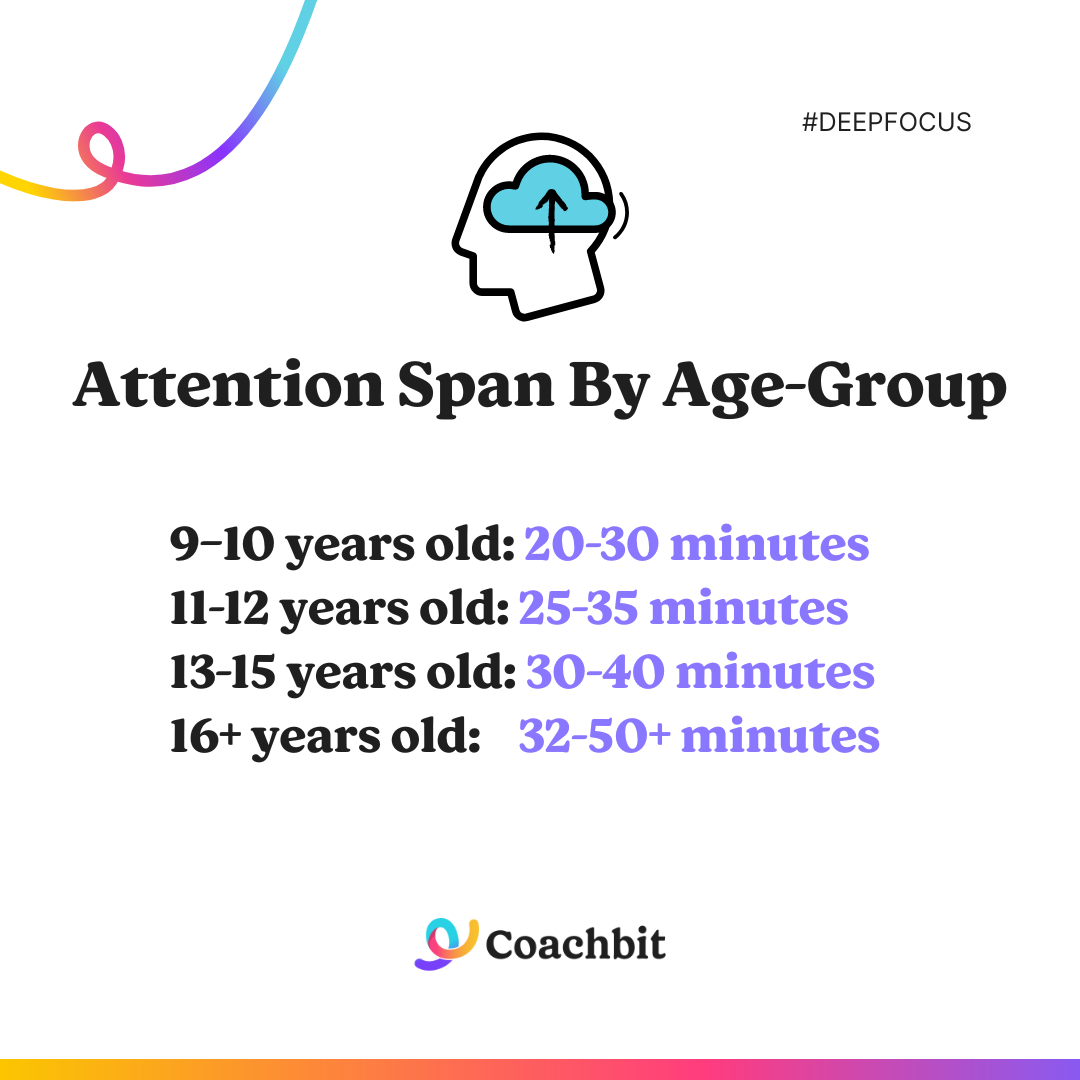
We all experience it - after about an hour or so of focused work, your brain becomes fuzzy, your energy level wanes and you start craving a snack. Pushing through the slump is not always beneficial.
When it comes to attention spans, teenagers have it even worse than us. The average teenager has an attention span of approximately 35 minutes. Pre-teens, younger children, and those with ADHD have even less than that. After that, much like adults, their focus dwindles and their mind begins to wander elsewhere. This is why hours of studying or homework, without structure or breaks, are rarely successful or sustainable.
At Coachbit we teach our students to make use of focus sessions to structure their studying and homework time. These strategies are based on the well-known Pomodoro Technique and Deep Work Principles. So what are these strategies and how are they beneficial to our students?
What is The Pomodoro Technique?
'Pomodoro' is the Italian word for tomato. The Pomodoro Technique was first introduced by Francesco Cirillo who, as a university student in 1980, used a kitchen-timer, in the shape of a tomato, to break up his work and take breaks.
The technique has since gained traction as a popular time management method around the world. In its most simple form the technique goes as follows:
Set a goal (decide which task needs to be done)
Set a timer -- for 25 minutes
Work on the task
When the timer rings, end the session
Take a short break (5-10 minutes)
Repeat steps 2-5 three times.
After every four Pomodoro sessions (timed work sessions) take a longer break (20-30 minutes)
What is Deep Focus?
The principles of the Pomodoro Technique align with the concept of Deep Work, introduced by Cal Newport, Associate Professor of Computer Science at Georgetown University.
Deep Work occurs when we are intensely focused on a single cognitively demanding task without interruptions -- a financial report or essay. Shallow Work, on the contrary, takes place when we are busy and often distracted -- checking our emails while catching up on series in the background. It goes without saying that Deep Work is necessary for increased focus, memory, and productivity.
A key element of Newport's Deep Work concept is the 'Time-Limit'. This time limit, similar to the Pomodoro Technique, helps to intensify focus and motivation as it shifts you into a 'scarcity mindset', pressurizing you to concentrate and produce during the session.
In our curriculum, we have combined the two techniques to create 'focus sessions' which students can use for homework and studying. These sessions are based on three key principles:
1. Focus on one thing at a time (set a goal)
2. Set a time limit
3. Control your environment
Our method is also inspired by the principles of Tiny Habits as discussed by BJ Fogg. This ensures that tasks or habits are broken up into bite-size and actionable chunks in order to create behavior that is sustainable. This not only guides the time limit we choose for our sessions but also the goal we set ourselves.
Our Coachbit App has a Focus Timer through which students can set a timer for a chosen amount of time and harness the power of focused work. We generally start them off with 5 or 15 minutes and slowly increase them to up to 45 minutes, depending on their capacity.
We also encourage our students to set up a controlled environment which is crucial to the success of the focus sessions. A dedicated and clutter-free homework space should be selected away from distractions such as cell phones, pets, or even chatty family members. When students take breaks in between focus sessions, they should leave the homework space. We often recommended that they get some sunlight or fresh air, and grab a glass of water or a snack.
It is important to remember that when it comes to attention, every student is different. If you have noticed at home or in school that your child struggles to focus for more than 5-10 minutes, there could be an underlying problem worth following up on.
Here is a helpful guide to the average attention span per age group.

The Benefits of Deep Focus Sessions
1. Increases Motivation
Research shows that when we lose focus we become easily distracted and make more mistakes. This means we lose motivation rapidly.
This is because, according to neuroscientist, Dr. Adam Gazzaley and psychologist, Dr. Larry Rosen, "the shorter the time between reinforcements (rewards), the stronger the drive to complete that behavior and gain the reward."
Gazzaley and Rosen's book, The Distracted Mind, considers how breaking working sessions into smaller sessions with break intervals boost our motivation and our brain's incentive for reward. Our students' desire to grab a snack, check their phones or walk about during their breaks is what drives them to complete the session.
2. Improves Quality of Work
The use of timed focus sessions is shown to improve concentration and mental stimulation. This ultimately means that the work we are producing during these sessions is of better quality than the work we produce during endless hours of shallow work. Studies show that multitasking rapidly slows progress and increases the chances of making errors and mistakes.
Limiting multitasking and removing distractions also prolongs our ability to do cognitive work and ultimately wards off mental fatigue from setting in early on. Mental fatigue, more than an obscure concept, actually refers to the decrease in cerebral blood flow. Rewards, i.e. a break, have also been shown to reduce the possibility of mental fatigue. By taking a break one can increase cerebral blood flow and 'restore performance to pre-fatigue levels." This, again, links to the increase in motivation.
3. Boosts Focus
A recent studyout of the University of Illinois debunked common understandings of attention. The study compared the performance of participants who performed a 50-minute task with no breaks, with participants who took two brief breaks during the task. Those who took breaks were able to focus for longer and showed better performance at the task.
The study found that attention is not a resource that gets used up. Like a battery, it does not drain or need recharging. Rather than becoming depleted after experiencing fatigue or distraction, our attention merely shifts elsewhere. The author of the study, Alejandro Lleras explains, "You start performing poorly on a task because you've stopped paying attention to it. But you are always paying attention to something. Attention is not the problem."
Our brains are built to respond to change and spending prolonged periods trying to focus on a specific task hinders our performance. The best thing we can do to stay focused on a task, such as studying for an exam, is to take breaks.
Final Thoughts
The science supporting Deep Focus Sessions is overwhelming. They greatly improve:
- Motivation
- Quality of Work
- Focus
That's why we have seen such great results in our students who make use of the technique during their studies. If you're not yet convinced, it's likely that you may need to take a break yourself and return back to this article with greater focus.
Sources
Blasche G, Szabo B, Wagner-Menghin M, Ekmekcioglu C, Gollner E. Comparison of rest-break interventions during a mentally demanding task. Stress Health. 2018 Dec;34(5):629-638. doi: 10.1002/smi.2830. Epub 2018 Aug 16
Atsunori Ariga, Alejandro Lleras. Brief and rare mental 'breaks' keep you focused: Deactivation and reactivation of task goals preempt vigilance decrements. Cognition, 2011
Francesco Cirillo, The Pomodoro Technique
Cal Newport, Deep Work
BJ Fogg, Tiny Habits
Adam Gazzaley and Larry D. Rosen, Distracted Mind: Ancient Brains in a High-Tech World
How many core habits and skills is your child missing?
Take our short quiz and find out.
Take our quiz
_Z2bR53f.webp)

